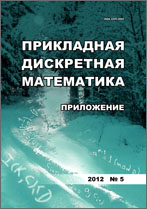|
Mathematical Methods of Cryptography
Experimental estimates of the computational complexity of one class of cryptoalgorithms based on the generalization of Feistel networks
V. M. Fomichevabcd, D. A. Bobrovskiyad, A. M. Korenevaa
a "Security Code", Moscow
b National Engineering Physics Institute "MEPhI", Moscow
c Federal Research Center "Computer Science and Control" of Russian Academy of Sciences, Moscow
d Financial University under the Government of the Russian Federation, Moscow
Abstract:
The development of information technologies and the need to protect information indicate the relevance of developing new cryptographic algorithms, such as block ciphers with different block sizes that correspond to modern requirements for cryptographic stability and performance. This paper presents the results of experimental studies of algorithm 256-3 performance (block size is 256 bits), proposed by Russian researchers in 2018. This paper provides a performance comparison between 256-3 and well-known block ciphers. The comparison has been conducted by running implementations of algorithms in C++ programming language using Crypto++ library. The results showed that the 256-3 algorithm runs around 24.57 cycles per byte and performance of 256-3 from 1.2 to 2.6 times higher than the performance of the algorithms Magma (GOST 28147-89), Kuznyechik (GOST 34.12-2018), SEED, HIGHT, Camellia-256, Kalyna-256/256, MARS-256, CAST-256, which indicates that 256-3 is a positive (from the synthesis position).
Keywords:
block cipher performance, block ciphers benchmarks, 256-3, GOST, Magma, Kuznyechik, AES, Rijndael, SEED, SM4, HIGHT, Camellia, Kalyna, MARS, CAST, RC6, Crypto++.
Citation:
V. M. Fomichev, D. A. Bobrovskiy, A. M. Koreneva, “Experimental estimates of the computational complexity of one class of cryptoalgorithms based on the generalization of Feistel networks”, Prikl. Diskr. Mat. Suppl., 2020, no. 13, 59–62
Linking options:
https://www.mathnet.ru/eng/pdma498 https://www.mathnet.ru/eng/pdma/y2020/i13/p59
|

| Statistics & downloads: |
| Abstract page: | 207 | | Full-text PDF : | 120 | | References: | 29 |
|




 Contact us:
Contact us: Terms of Use
Terms of Use
 Registration to the website
Registration to the website Logotypes
Logotypes








 Citation in format
Citation in format 